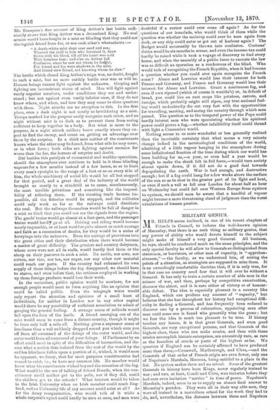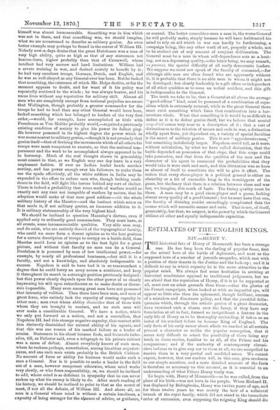MILITARY GENIUS.
tir R. HELPS seems inclined, in one of his recent chapters of In Friends in Council, to indorse the well-known opinion of Macaulay, that there is no such thing as military -genius, that any person of ability who would devote himself to the subject might make of himself a very good General. All business, he says, should be conducted much on the same principles, and the only special faculty he will allow to Generale as distinguished front statesmen, or barristers, or other men of capacity, is "apprehen- siveness," — the faculty, as we understand him, of seizing the points of a situation, as strategists are supposed to seize them. It is an exceedingly comfortable doctrine that, if it is only true, for in that case no country need fear that it will ever be without a General. It has only to train a certain number of able men in the science of war, and then, perhaps by competitive examination, discover the ablest, and it is sure either of victory or of honour- able defeat. The idea is especially pleasant to a country like England, which can produce any amount of "capacity," but believes that she has throughout her history had exceptional diffi- culty in finding a General, and has frequently been reduced to discover one by a process of exhaustion, appointing man after man until some one is found who generally wins the game ; but we fear the idea is much too pleasant to be true. If history teaches any lesson, it is that great Generals, and even good Generals, are very exceptional persons, and that Generals of the highest class, those who can make armies, and then with those armies accomplish historic enterprises, are excessively rare, as rare as the founders of _ creeds or poets of the highest order. We question if England can be certainly affirmed to have produced more than three,—Cromwell, Marlborough, and Clive,—and the Generals of that order of French origin are even fewer, only one of Napoleon's Marshals, Massena, being entitled to a place in the list. No system makes them and no school. Some of the greatest Generals in history have been Kings, never regularly trained to war ; and two, at least, Conde and Clive, won victories before they had seen even imitation "service" in time of peaca. Napoleon's Marshals, indeed, seem to us to supply an almost final answer to Macaulay's paradox. 'They were all in their way able men, they were all trained in a marvellous school for the work they had to do, and, nevertheless, the distance between them and Napoleon
himself was almost immeasurable. Something was in him which was not in them, and that something was, we should imagine, what we are accustomed to describe as military genius. An even better example may perhaps be found in the career of William III. Nobody now-a-days denies that the great Dutchman was a man of very high ability, quite as high as that of any statesman not heaven-born, higher probably than that of Cromwell, whose intellect had very narrow and hard limitations. William had a severe training in war, and desired acutely to benefit by it ; he had very excellent troops, German, Dutch, and English, and he was as well obeyed as any General ever has been. But he lacked that something, the existence of which Mr. Helps doubts, or for the moment appears to doubt, and for want of it his policy was repeatedly scattered to the winds ; he was always beaten, and his name lives without any reputation for military skill. Almost all men who are completely exempt from national prejudice are aware that Wellington, though probably a greater commander for the troops he had to lead than any other General would have been, lacked something which has belonged to leaders of the very first order,—would, for example, have accomplished as little with Frenchmen as Von Moltke probably would,—required a previously existing condition of society to give his power its fullest play. He however possessed in its highest degree the power which in war seems nearest to military genius,—though it is not precisely that genius itself—that of devising the movements which of all others his troops were most competent to execute, so that the national tem- perament and the work to be accomplished always appeared to be in harmony. Much of the real thought shown in generalship must consist in that, as we English may one day learn in a very unpleasant fashion. If ever an Indian leader heads another mutiny, and has power enough over his followers to make them use the spade effectively, all the white soldiers in India may be expended in the effort to reduce men who, though lacking confi- dence in the field, will fight like heroes behind any sort of shelter. There is indeed a probability that some mode of warfare would so exactly suit any race not incapable of warfare by nature, that its adoption would make of that race good soldiers—vide the whole military history of the Maories—and the instinct which seizes on that mode is, if not military genius, an immense addition to it. It is military statesmanship of the very highest kind.
We should be inclined to question Macaulay's dictum, even if applied only to ordinarily good commanders. They must have, at all events, some incommunicable qualities. Very able men may, and do exist, who are entirely devoid of the topographical faculty, who could no more form a decent opinion as to the best position for a certain description of troops to occupy on a battle-field, than Maories could form an opinion as to the best light for a great picture, and without that faculty no man can be a General Doubtless it is possessed by men of low intellectual power,—for example, by nearly all professional huntsmen,—but still it is a faculty, and not a knowledge, and absolutely indispensable to success. Napoleon is said to have had it in so transcendent a degree that he could hurry an army across a continent, and keep it throughout its march in a strategic position previously designed ; but that power clearly depends upon the other power of so clearly impressing his will upon subordinates as to make doubt or discus- sion impossible. Many even among great men have not possessed that intensity of volition. Then there have been men, and men of great force, who entirely lack the capacity of rousing capacity in other men ; men even whose ability diminishes that of those with whom they are brought in contact, and no such man will ever make a considerable General. We have a notion, which we only put forward as a notion, and not a conviction, that Napoleon III. had this strange negative capacity, that contact with him distinctly diminished the natural ability of his agents, and that this was one reason of his marked failure as a leader of armies. Statesmen in his closet became fools, and Generals imbe- ciles, till, as Pelissier said, even a telegraph to his private cabinet was a cause of defeat. Almost everybody knows of such men, whom he reckons perhaps, nevertheless, among his ablest acquaint- ances, and one such man exists probably in the British Cabinet. No amount of force or ability for business would make such a man a General. Nor is it possible to make a leader in the field out of a man, however competent otherwise, whose mind works very slowly, or who fears responsibility, or, we should be inclined to add, whose mind is so deficient in sympathy that he can never reckon up what his enemy is likely to do. After much reading of his history, we should be inclined to point to that as the secret of most, if not all the defeats, of William III. And above all, no man is a General whose mind is without a certain loneliness, a capacity of being stronger for the atisence of advice, or guidance, or control. The better committee-men a man is, the worse General he will probably make, simply because he will have habituated his mind to rely on aid which in war can hardly be forthcoming, a campaign being, like any other work of art, properly a whole, not to be evolved out of any amount of conjoint deliberation. The General must be a men in whom self-dependence acts as a heat- ing, not as a depressing quality,—the latter being, we may remark, en passant, the special difficulty of all really democratic leaders. We suppose we must not speak of the faculty of command,—for although able men are often found who are apparently without it, it is probable that there is no able man in whom it might not be developed ; but clearly leadership is a gift often so independent of all other qualities as to seem an unfair accident, and this gift is indispensable to the General.
The truth we take to be, that a General at all above the average " good-officer " kind, must be possessed of a combination of capa- cities which is extremely unusual, while in the great General there must exist something which fuses that combination into a har- monious whole. What that something is it would be as difficult to define as it is to define genius itself, but we believe that mental coup dceil comes very near to a description of it ; that a sort of divination as to the relation of means and ends in war, a divination wholly apart from, yet dependant on, a variety of special faculties is the Secret of military genius. This is not "apprehensiveness," but something indefinitely larger. Napoleon could toll, as it were, without calculation, by what we have called divination, that the battle depended on possession of that slope, that this corps could take possession, and that from the qualities of the men and the character of his agent in command the probabilities that they would take it were such and such, and this divination was so keen as almost of itself to constitute the will to give it effect. The notion that every chess-player is a political general is either an absurdity or a bit of excusable brag in the worshippers of the game, but the fancy that there is a relation between chess and war has, we imagine, this much of basis. The fusing quality must be there. A man may be a good chess-player and a goose, lacking almost every quality of a good General ; but he must have that one, the faculty of divining amidst exceedingly complicated data the course which will reconcile means and ends. That is not., of itself, generalship, but that, we suspect, is the power by which the General utilizes all other and equally indispensable capacities.



































 Previous page
Previous page